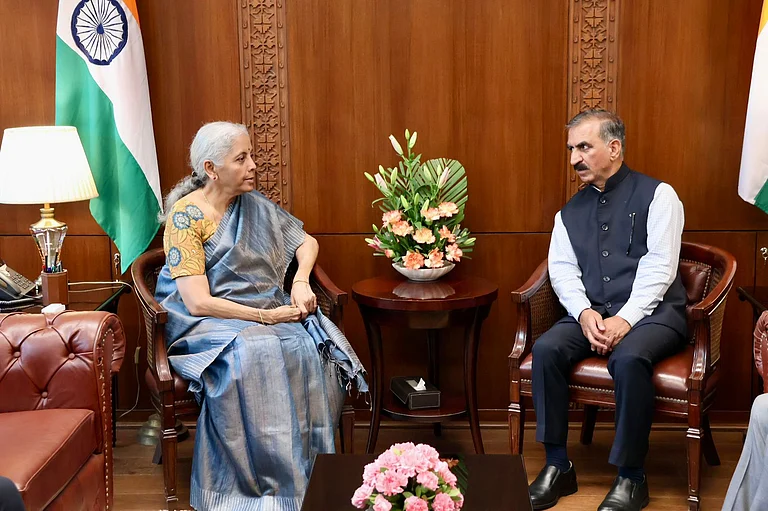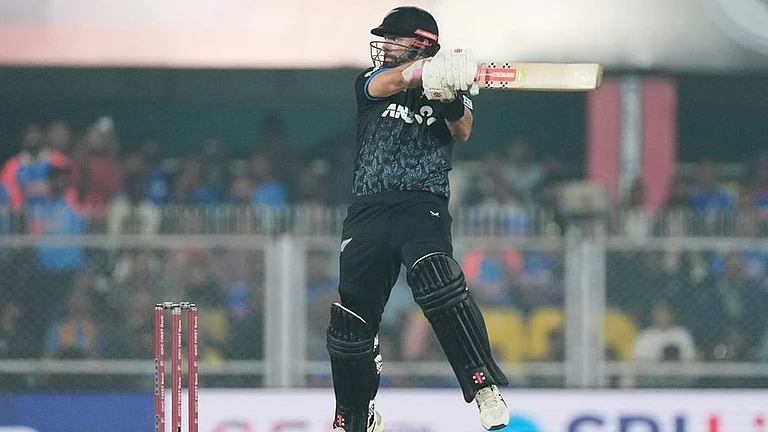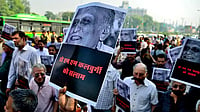On July 30, former Punjab Deputy IGP Harinder Singh Chahal stood near a newly-installed statue of Sidhu Moosewala—who was assassinated on May 29—alongside the slain singer’s father, Balkaur Singh, and addressed the mourners. As Chahal, who has been decorated with President’s Police Medal for Meritorious Services, mimicked a handgun and pulled the trigger, he touched upon the biggest unresolved murder mystery in Punjab’s music industry—the fatal shooting of Amar Singh Chamkila and his singer-wife Amarjot with two other members of their band, on March 8, 1988. “Those who had killed Chamkila, I killed them,” Chahal declared in Mansa’s Moosa village to a tepid response from the gathered crowd. Just a few days ago, Punjab Chief Minister Bhagwant Mann had congratulated the state police for killing two gangsters who were allegedly involved in Moosewala’s murder. Then too, the public response was of indifference, unlike the wild public celebrations after the encounter killings of criminal Vikas Dubey in Kanpur or after that of four alleged rapists in Hyderabad.
There is a reason why Punjab takes such encounter killings by police with a pinch of salt and scepticism. Punjab’s psyche has been wounded and bloodied by over a decade of armed insurgency that was marked by forced disappearances and staged encounters, a tactic that was widely used by the police to dispose of suspects. Over the years, Punjab’s insurgency has seen several films on the subject, some done sensitively, others not so. A new biopic on Sikh human rights defender Jaswant Singh Khalra (1938-1995)—starring Diljit Dosanjh and releasing shortly—is yet another effort to put the spotlight back on the state’s darkest phase.
‘Guardian of unclaimed bodies’
An Amritsar-based rights activist known as the ‘guardian of unclaimed bodies’ for his probe into extrajudicial killings between 1980s-1995, Khalra was abducted, tortured and secretly murdered by a few Punjab Police personnel. Khalra had accused the police of cremating 2,097 bodies in Amritsar, Tarn Taran and Majitha clandestinely. Even the United Nations had taken note of his research in September 1995, soon after the assassination of then chief minister Beant Singh earlier in the year. In 2006, Ensaaf—a US-based human rights organisation—had demanded a CBI probe against the then DGP K.P.S Gill for his alleged involvement in the killing of Khalra. Paramjit Kaur, Khalra’s wife, had petitioned the Punjab and Haryana high court, seeking action against Gill, who died in 2017 without facing a trial. Gill had, however, refuted the allegations, claiming that “Khalra must have been killed by terrorists”. But the Punjab and Haryana high court in 2007 and the Supreme Court in 2011 upheld the life imprisonment of five cops convicted in the case.

On November 15, 1995, the apex court took cognisance of the extrajudicial killings, in response to a petition filed by Paramjit Kaur. It led to a CBI probe into Khalra’s abduction and mass secret cremations. Following the probe, the top court, in its order dated December 11, 1996, acknowledged “flagrant violation of human rights on a mass scale”. Subsequently, the CBI established several cases of extrajudicial killings, including fake encounters between 1995 and 1998. While chargesheets have been filed in 44 cases, trials are pending in a majority of these cases. There is also a longstanding demand for increasing the ambit of the CBI probe.
On the basis of interviews with the aggrieved families, Ensaaf has highlighted 5,302 cases of forced disappearances and extrajudicial killings in Punjab. Similarly, the Punjab Documentation and Advocacy Project, a Chandigarh-based human rights advocacy group, released a report in December 2017, claiming that 8,257 persons who had disappeared between 1980 and 1995, had been cremated as unidentified and unclaimed bodies. Their findings were based on the scrutiny of encounter FIRs and data obtained from cremation grounds. Seeking a probe by an independent judicial panel, its PIL in the Punjab and Haryana high court refers to the Supreme Court’s 2017 intervention in the extrajudicial killings and disappearance of 1,528 people in Manipur over two decades and the apex court’s legal proceedings in the Khalra case.
Culture of impunity
Some recent court judgments reveal how the ‘bullet for bullet’ policy ushered in a culture of police impunity. A special CBI court in Mohali held in its ruling in 2018 that 16-year-old Harjit Singh from Amritsar district’s Sultanwind village was abducted in 1992 and killed. The court awarded life sentences to two retired sub-inspectors, Narinder Singh Malhi and Gian Singh. Likewise, another CBI court order in 2018 exposed the 1992 fake encounter of 15-year-old Harpal Singh from village Palla in Amritsar. While awarding life imprisonment to Raghbir Singh, the then station house officer of Beas police station, and Dara Singh, a then sub-inspector, the court held that the police’s claim about the encounter was fabricated.
ALSO READ: Fake Encounters In India: Laws, Flaws & Fear

In the fake encounter of two men, Kuldeep Singh and Gurmail Singh, another CBI court awarded life sentences to a retired DSP, Harjinder Pal Singh, the then station house officer of Ropar (Sadar), in 2019. In October last year, the SC dismissed a petition by 41 Punjab cops, mostly retired, questioning the jurisdiction of the CBI in probing the disappearance of 20 youths from Amritsar, Tarn Taran and Gurdaspur districts in Punjab between 1992 and 1994. The case against the accused cops was registered following the apex court’s directions in 1997. In 2015, a CBI court awarded life sentences to eight retired policemen, including a former superintendent of police, in some 1992 fake encounter cases in Jalandhar.
Sumedh Singh Saini, who was the state’s top cop between 2012 and 2015, has also been in the eye of the storm. In May 2020, Punjab Police booked Saini in a 29-year-old case of the disappearance of a government official when Saini was the SSP Chandigarh. The case was registered following the disclosures made by Gurmeet Singh alias Pinki, a murder convict who was once hailed as the state’s top anti-terror cop, in an interview to senior journalist Kanwar Sandhu, which was published by Outlook in 2015. Earlier, in October 2018, the high court had given Saini protection from arrest in cases pertaining to incidents when he was state vigilance head, inspector general of police, head of intelligence, and director general of police.

Confessions of killers
Encounter specialist Pinki, in several media interviews, disclosed how the Punjab Police eliminated hundreds in staged killings during the height of Sikh militancy. According to him, he has been witness to at least 50 staged encounters. “In (the) name of fighting terrorism, utter falsehood was enacted day after day,” Pinki had stated in an interview. “Suspects were picked up in one place, taken to a second, kept in a third, and the encounter shown in yet another place.” Similarly, in 2013, a Punjab Police sub-inspector Surjit Singh confessed to having killed more than 80 people in fake encounters. In his petition before the Punjab and Haryana high court, he listed at least 16 fake encounters in which at least three dozen persons, including some unidentified, were killed. His petition, however, was rejected by the court.
Zone of darkness
While the poster boys of counter-insurgency continue to live in constant fear amid growing demand for release of Sikh political prisoners, many suspended cops feel they were used as expendables. Following Moosewala’s murder, Gurmeet Singh Pinki had decried the withdrawal of his own security detail. “If they want me to be killed this way, let it be so. But this game is not going to stop here this time,” says Pinki, who was inducted into the police in 2015 after he had served life imprisonment in a murder case. But his reinstatement was soon revoked following the court’s intervention. He claims to be the lone witness in the Multani murder case against Sumedh Singh Saini.
Before he was abducted and killed, Jaswant Singh Khalra, while delivering his last speech, had narrated a fable: “When the sun was setting for the first time, lamentation was rife that the sun will set and darkness will spread. To show its strength, darkness set its foot on the earth, but far away in a small hut, one little lamp lifted his head. It proclaimed, ‘I challenge the darkness. If nothing else, then at least around myself, I will not let it settle.’ And it is said, watching that one lamp, in other huts other lamps arose. And the world was amazed that these lamps stopped the march of darkness...” This darkness has been addressed in Maachis (1996), a political thriller written and directed by Gulzar and set against the turbulent phase in the aftermath of Operation Bluestar, Prime Minister Indira Gandhi’s assassination and the 1984 anti-Sikh riots. The movie ends with the suicide of two protagonists and a shot of a news-clipping with the headline, “SC asks CBI to prosecute 27 Punjab cops”. According to the news report, the 27 cops, including then SP Vivek Mishra and DSP Baldev Singh, were involved in gunning down four persons in January 1994. While six of the accused cops are dead, Singh is still facing trial whereas Mishra, who had become assistant IGP, committed suicide by shooting himself with his service revolver at his residence in 2007. Earlier in 1997, SSP Ajit Sandhu, twice decorated with the President’s Police Medal for Meritorious Services and a prime accused in the abduction and killing of Jaswant Singh Khalra, had allegedly jumped in front of a moving train and was run over by it.
(This appeared in the print edition as "Dateline Punjab")


























